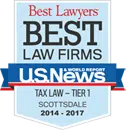Criminal Tax Evasion vs. Negligence Ignorance of the law is not a defense of the…
Coffey vs. CIR: Tax Filing With the Virgin Islands
A Statute Of Limitations Begins When The Taxpayer Files The Return
In an appeals case in Coffey vs. Commissioner, the IRS sought to overturn a lower court ruling that found in favor of a couple whom the IRS had pursued for non-payment of taxes. Our Paradise Valley tax attorneys provide a detailed explanation of the case.
In the original case, Judith Coffey claimed to be a bona fide resident of the U.S. Virgin Islands. Such residents need only pay 10 percent taxes in the Virgin Islands, and they file their tax returns to the government there, which then reports them to the larger U.S. government. Those who live in the Virgin Islands but who are not considered “bona fide” residents have to file their taxes both in the Virgin Islands and in the United States.
The IRS found that Coffey was not a bona fide resident of the Virgin Islands and, therefore, was required to file a tax return with the U.S. government, which she did not do in 2003 or 2004. Coffey argued that the three-year statute of limitations was long past from those filing years, and she sought relief from the U.S. Tax Court.
Initially, the Tax Court granted her motion for summary judgement. However, the IRS appealed, and the appeals court reversed that lower ruling and found that the Coffeys still responsible for making the payment.
The issue was when the statute of limitations was supposed to begin. The statute of limitations is supposed to begin when the taxpayer files the return. However, if a taxpayer does not file a return, there is no statute of limitations. The Coffeys argued that the three years had passed since they filed their return, so they were safe. The IRS argued that they never actually filed a return with the U.S. government, which they were supposed to do, so there was no statute of limitations. The appeals court agreed with the IRS’s argument, and it threw out the Coffeys’ claim that the reporting of their taxes by the Virgin Islands to the U.S. government constituted a tax “filing.”

Though the Coffeys argued that they made an “honest and genuine attempt” to satisfy their tax obligations, the appeals court found that they erred in not filing separately with the U.S. government and that the taxes were still owed, including the penalty and interest.
The case shows how complex foreign reporting requirements can be, and that even when an individual makes a good faith effort to meet these tax obligations, mistakes can still be made that cost them dearly. If you have recently been audited or notified by the IRS that you have violated some foreign tax reporting rule, consult with the Scottsdale tax lawyers at Silver Law PLC to learn about your legal options. We represent taxpayers in foreign tax reporting cases, including in audits and in civil and criminal litigation. We’ll pursue all strategies to minimize your liability. Contact Silver Law, PLC to talk with an experienced tax attorney and learn more.

Email: lchapman@silverlawplc.com
Website: taxcontroversy.com
Arizona Location
7033 E. Greenway Pkwy, Ste 200
Scottsdale, AZ 85254
Office:(480) 429-3360
Henderson Location
410 South Rampart Blvd, Suite 390
Las Vegas, Nevada 89145
Office: (702) 801-1000
Las Vegas Location
410 South Rampart Blvd, Suite
390 Las Vegas, Nevada 89145
Office: (702) 726-6819
San Diego Location
7676 Hazard Center Drive, Suite
1525 San Diego, CA 92108
Office: (619) 387-3790
Coronado Location
724 1st St.
Coronado, CA 92118
Office: (619) 612-5337
Utah Location
11576 S. State Street, Suite 1002
Draper, Utah 84020
Office: (801) 340-7514
















Leave a Reply
You must be logged in to post a comment.